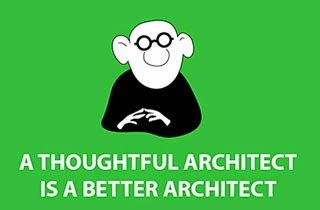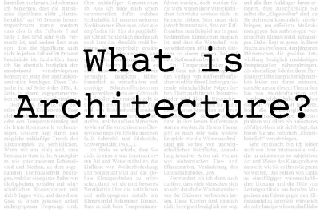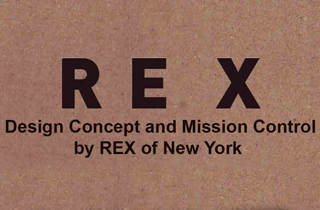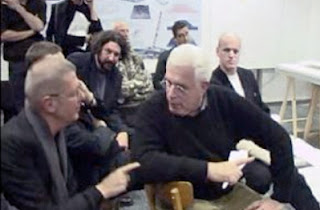
While the above description is of one person's definition of the starchitecture system, below is a few responses on how to engage it (or apply a verb to it). The comments are from the same archinet thread reacting to Phillip Nobel's article in Metropolis Magazine "Anti-Starchitecture Chic". The original thread has a lot of interesting moments but all in all a chaotic stream of chatter that was difficult to follow. So I have tried to categorize them into some common themes and consensuses, while trying to keep the flavor and flow of the conversation. The assembled responses below has been selected not necessarily because I agree with them but because they are provocative and interesting within themselves. I enjoyed the candidness and [for better or for worse] it is an interesting demonstration of the logic of the collective.1.FLIP THE SYSTEM - FUCK THE SYSTEM-I am tired of media hype being the primary goal of starchitects. I rather have social and environmental guru's or genius's like Bill McDonough, Cameron Sinclair, or Ed Mazria getting all the attention, since they are creating the future for our planet. Rem, Gehry and their like won't save the earth or create a better society, but there are architects and designers who will. Lets celebrate them instead.
until then: 'fuck Frank Gehry' and while I'm at it, fuck Zaha
- completely agree, but I also feel like these "gurus" should be built into the code of the profession not the anomalies. The current system would not allow that
-Well, then fuck the system. The only truly credible course may be to reject the very idea of using yourself as a brand, (and) to work and work well...to me that's integrity.2. DON'T UNDERESTIMATE THE SYSTEM-Isn’t it too easy to say that it doesn’t matter? For example Ghery can write contracts unlike most architects out there. The result is that you and I will never be able to compete with him in control of a project, etc... And at what point does the drive for fame (to be able to write contracts and make money like Ghery) turn into the superficial drive for the next cool form? When is it gimmicky?
I am using Ghery as an example I could say Zaha, Libeskind, OMA,
-Just to mix things up a little, we should also remember that since the Bilbao effect, the marketing and exposure that comes with a "starchitect" translates directly into $$$ to clients and the area. It goes beyond architect/starchitect worship...it's also public/event worship...also, I like to admire talented architects...both starchitects and local unknown architects...I think it's a natural process in our profession.
-The 'average person' is not the average client for a major architectural project. Most corporations, museums, libraries, etc are looking for star power these days.... Chipperfield and Holl's recent museum projects are good examples, as are projects at major universities (Vincent James at Tulane, Rem at IIT, Holl in Iowa) and most of the Asian projects that we hear about over here. You can bet that none of these clients is simply taking proposals and picking the ones they think will be best for the job. They're looking for recognition by association.
-...In general, I think we're painting this picture with a fairly broad brush, basically assuming that clients are lamely saying, "I want a Gehry" or "I want a Meier." On the contrary, most clients are quite savvy about the architect they are selecting. The client that chose Meier for the high-end condos in Chelsea chose him because he knew he could market that name to architecturally-conversant wealthy home buyers. Could he have done the same with Gehry? A museum that selects Holl, let's say Chiasma, knows that Holl will provide a design of a significant quality that will potentially complement the art displayed. moreover, let's be honest, the starchitect 99% of the time is flat-out a better designer than Joe Blow architect. It is more than a name these clients are buying, but clearly the name doesn't hurt either.3. INFILTRATE THE SYSTEM4. ACCEPT THE SYSTEM-We also must acknowledge that there's often a separation between the fame and the actual design being created by some of these architects we're alluding to.
What I'm getting at is that, for example, the first thing Karim Rashid (Asymptote's Hani Rashid's industrial designer brother) did after graduating school was to hire a PR manager. PR is the name of the game....
...I don't care either way for 'starchitects.' If somebody's doing good work, whether they're a media darling or not, I'm interested. It's easy to criticize those who've risen to fame.... that's the way the game is played right now, and it's not going to change for a little while yet....
-Media and marketing is everywhere today...architects choosing to ignore opportunities for public exposure for a sense of "integritry" just reflects our profession's inability to function in today's world...the starving mysterious missunderstood eccentric artists.
...and except for maybe Phillip Johnson, I doubt any architect or starchitect " seeks fame for fame's sake", they seek fame so they can get commissions with less restrictions than we do. ...
why can't we improve and educate, but also Dazzle!?
-Being an architect, I assume you need to find ways to get your ideas built... star/non starchitect system, whichever ways works for you, I do not see any evil beings in either of the systems. I always think is more efficient to have a PR or agent works for you, so you have more spare time to work on design rather than socialising with the press.- I have no problem with the whole "starchitect" system. We live in an age where media is king. The majority of our thoughts and opinions are based from this. I would rather hear about a designer in the media than another vapid story on Hollywood celebrity. The "starchitecture" system has always filled that media gap no matter if it is sensationalist or not. "No press is bad press" What would Metropolis rather write about?
You need a human face behind the buildings.
5. BEWARE THE DANGERS OF THE SYSTEM...this is my greatest fear, and Libeskind is a great example of (it): innovation turned to kitsch. Seems like the question that arises is: What is worse for the profession; not playing the PR game, or becoming kitschy?
6. BLAME THE MESSENGERS IN THE SYSTEM-Architecture business unlike others like fashion designer/hair dresser, mostly clients do not come back for more... therefore exposure is part of the survival tactic to expand the network... some become more "loud or stylistic" in the market and become labeled as star... I wouldn't blame the market nor someone being a star for producing work which I do not like... that's reality!
Its not the architects its the coverage of the architects. Its the misdirected hero worship of the architects. These are not fucking rock stars okay. They are very talented people running businesses that require exposure to be successful. Don't blame them. blame the ridiculous media and the namedropping starfuckers
-Has Rem not worked hard? You think Zaha didn't pay her dues?
-...the burdens may be different. Maybe they don't have to hunt down the work, but they have to pick the projects that will keep them going, maintaining the reputation. They have to make each project measure up to the previous work and the expectations that work has created...
7. DECENTRALIZE THE SYSTEM...I am proposing that one has to go out there and work with others. Connect in ways that were not possible before, and in that way define how we work. However, I am not advocating for a communal ideal either. What I can see happening is a series of “free agents” coming together for projects with other “free agents” placing the importance on the individual project itself, then moving on and doing other projects. How you would get projects and answer RFP’s, not sure....
-...Exactly! the media as process and method of working, not as glossy images and name dropping.
...But still, it is nice to hold hands and sing kumbaya we are the future, but what are the problems; who signs the drawings? Will there be drawings to sign? Copyrights and intellectual property?as Nobel mentions the starchitect system also works because clients want it, how do you change that economic reality?...
-I agree that the future model of architectural practice lies within open source collaboration, especially within the context of new media technology and building information modeling, but even within this model, I don't think old hierarchies and star-architects will go away unless you look at and address the incentives that perpetuate this system whether economic or the simple desire for fame.
What is the first step? To do away with the pritzker prize?
-Perhaps, but who would turn down the pritzker?
Celebrity isn't going anywhere. In fact it will likely only become more extreme with increased accessibility to media























































